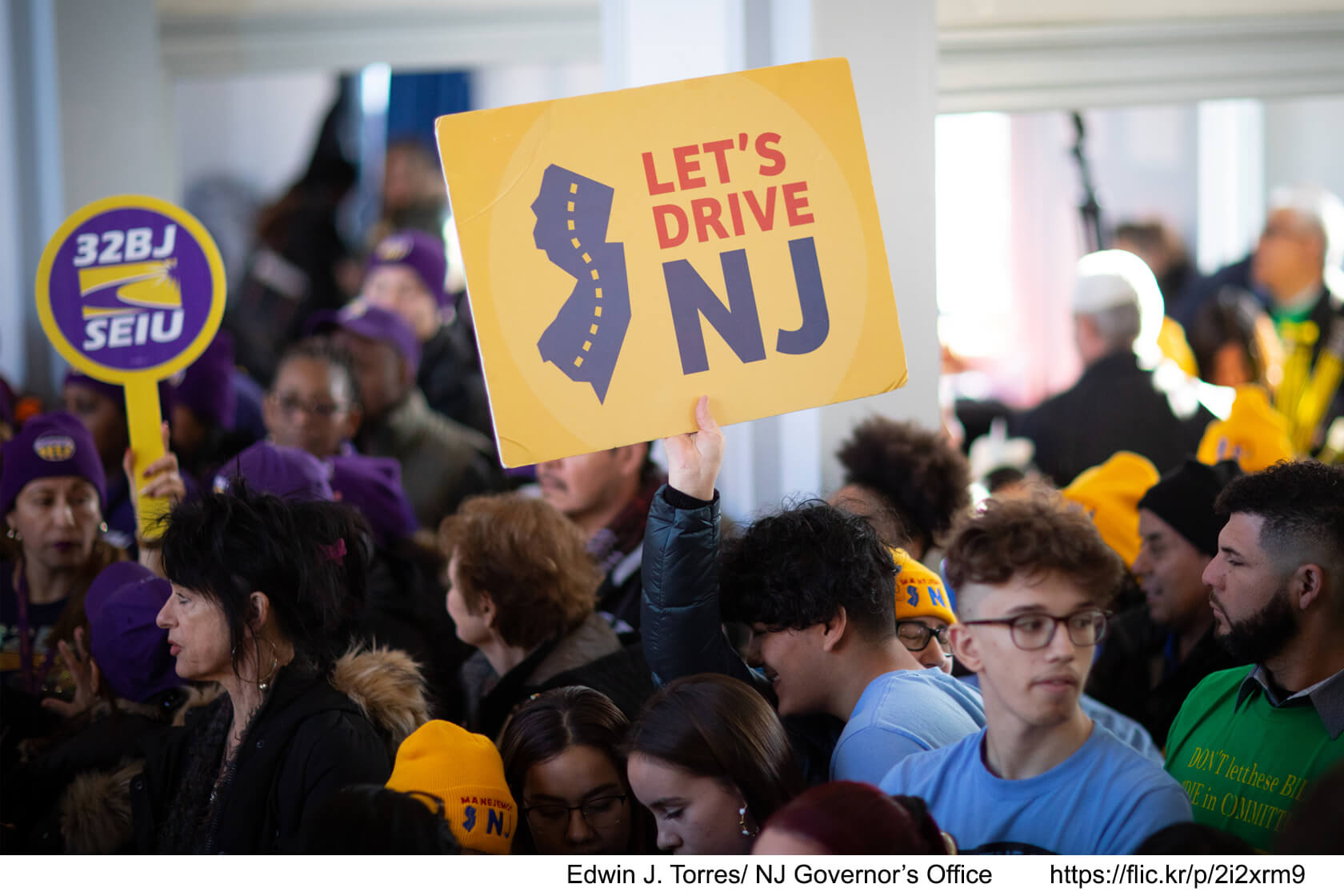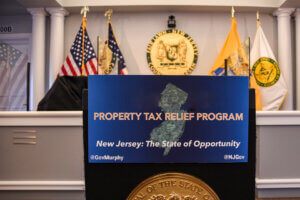West Long Branch, NJ – There has been a sea change in New Jersey over the past decade about whether key state resources should be made available to immigrants in the country illegally. The Monmouth (“Mon-muth”) University Poll finds a majority of the public now supports allowing these immigrants to get driver’s licenses – a new policy that went into effect this month. Half also support allowing these undocumented residents to attend state colleges at in-state tuition rates. Few Garden State residents supported these policies just over ten years ago. Concerns about the impact of illegal immigration on the state have also declined sharply over this period.
A solid majority (57%) of New Jersey residents favor “allowing illegal immigrants to get some type of limited driver’s license.” Twelve years ago, just 33% supported this accommodation for these noncitizens. Just 41% currently oppose this, versus a much larger 62% who stood in opposition to making driver’s licenses available to “illegal immigrants” in 2009.
“The New Jersey driver’s license available to undocumented immigrants may have fewer limitations than were envisioned when Monmouth first polled on this topic over a decade ago, but the wholesale shift in public opinion since that time is undeniable,” said Patrick Murray, director of the independent Monmouth University Polling Institute.
In 2009, there were few demographic differences in opinion on providing driver’s licenses for “illegal immigrants” in New Jersey. Support ranged from just 27% of Republicans to only 39% of Democrats. While Republican support for this idea has hardly changed since then – it is 31% among Republicans now – support has skyrocketed among Democrats to 77% in the current poll and it has also grown among independents (from 29% to 51%). Support for making driver’s licenses available to “illegal immigrants” has practically doubled among New Jerseyans between the ages of 18 and 34 (from 36% to 70%), and has also climbed significantly among those aged 35 to 54 (from 34% to 51%) and those 55 years old and over (from 31% to 51%).
The poll also finds that half (50%) of New Jerseyans support allowing “illegal or undocumented immigrants” living in the state to attend a public state college at the in-state tuition rate. Another 24% say these students should pay the higher out-of-state rate and 22% say they should not be allowed to attend a public college at all. Twelve years ago, though, just 20% of state residents supported granting in-state status to “illegal or undocumented immigrants,” while 37% said these students should be charged out-of-state tuition rates and 39% said they should be barred from attending public colleges at all. Support for providing in-state tuition to resident immigrants who are undocumented has gone up by 46 points among Democrats (from 25% to 71%), by 27 points among independents (from 15% to 42%), and by 9 points among Republicans (from 18% to 27%).
The public is evenly divided on whether immigrant students without documentation should be eligible to receive financial aid grants from the state. Just under half (48%) say they should be eligible and a nearly identical number (47%) say they should not. Support for this policy ranges from 70% of Democrats to 42% of independents and just 21% of Republicans. New Jersey started extending tuition grant eligibility to college students living in the state illegally in 2018.
“Providing financial aid for undocumented state residents is one policy where the Murphy administration is running ahead of public opinion as a whole, although it is clearly in line with evolved views in the governor’s own political party,” said Murray.
Public opinion about the impact of all immigration in general on New Jersey has not shifted as much as it has on illegal immigration. Currently, 37% of state residents say that immigration into New Jersey has been good for the state, 20% say it has been bad, and 33% say it has had no impact. The number who say immigration in general is good for the state has not changed much in the past decade (34% in December 2010), but the number who say it is bad has declined (from 32%) while the number who say it has had no impact has increased (from 21%). Opinion that immigration in general has been bad for the state has dropped among Democrats (from 26% to 4%) and independents (from 32% to 23%), but it remains relatively high among Republicans (44% in both 2010 and 2021).
Concerns about illegal immigration have lessened considerably over the past fourteen years. The number of New Jerseyans who see this as at least a somewhat serious problem for the entire country has gone from about 9 in 10 to just over 7 in 10, with the biggest drop coming from those who see this problem as very serious (from 69% in 2007 to 49% now). The lessening of this concern has been even more substantial in terms of illegal immigration’s impact within New Jersey, going from more than 3 in 4 seeing this as at least a somewhat serious problem for the state to just half who feel that way today. The number who said illegal immigration is a very serious problem for New Jersey ranged from 46% to 51% between 2007 and 2009, but it stands at just 24% today. This state-based level of concern has declined among all partisan groups since 2009 – from 44% very serious then to 9% now among Democrats, from 52% to 25% among independents, and from 64% to 49% among Republicans. There has also been a substantial double-digit decline among all age groups in concern about illegal immigration being a problem for New Jersey.
Among non-Hispanic white New Jerseyans specifically, opinion that illegal immigration is a very serious problem for New Jersey has dropped from 59% in 2009 to 29% now. At the same time, support for offering “undocumented college students” in-state tuition at public colleges has risen from 17% to 46% and support for offering “illegal immigrants” access to driver’s licenses has risen from 29% to 51% among non-Hispanic whites in the state.
The Monmouth University Poll was conducted by telephone from April 29 to May 4, 2021 with 706 New Jersey adults. The question results in this release have a margin of error of +/- 3.7 percentage points. The poll was conducted by the Monmouth University Polling Institute in West Long Branch, NJ.
QUESTIONS AND RESULTS
(* Some columns may not add to 100% due to rounding.)
[Q1, Q11-15 & Q30-37 held for future release.]
[Q2-10 & Q16-29 previously released.]
38.Overall, do you feel that immigration into New Jersey has been good or bad for the state, or does it have no impact?
| TREND: | May 2021 | Dec. 2010 |
| Good | 37% | 34% |
| Bad | 20% | 32% |
| No impact | 33% | 21% |
| (VOL) Both good and bad | 3% | 6% |
| (VOL) Don’t know | 6% | 7% |
| (n) | (706) | (2,864) |
39.How serious a problem do you think the issue of illegal immigration is for the United States right now – very, somewhat, not too, or not at all serious?
| TREND: | May 2021 | July 2007 |
| Very serious | 49% | 69% |
| Somewhat serious | 24% | 20% |
| Not too serious | 15% | 7% |
| Not at all serious | 10% | 4% |
| (VOL) Don’t know | 1% | 1% |
| (n) | (706) | (392) |
40.How serious a problem do you think the issue of illegal immigration is for New Jersey right now – very, somewhat, not too, or not at all serious?
| TREND: | May 2021 | Feb. 2009 | Sept. 2007 | July 2007 |
| Very serious | 24% | 51% | 47% | 46% |
| Somewhat serious | 27% | 28% | 33% | 30% |
| Not too serious | 28% | 10% | 11% | 16% |
| Not at all serious | 18% | 8% | 6% | 6% |
| (VOL) Don’t know | 3% | 4% | 3% | 2% |
| (n) | (706) | (803) | (801) | (408) |
41.Do you think that illegal or undocumented immigrants living in New Jersey should be allowed to attend a state college at the same reduced tuition rate as other New Jersey residents, should they pay the higher out-of-state tuition rate, or should they not be allowed to attend state colleges at all?
| TREND: | May 2021 | Feb. 2009 |
| Reduced in-state tuition | 50% | 20% |
| Higher out-of-state tuition | 24% | 37% |
| Not allowed to attend state colleges at all | 22% | 39% |
| (VOL) Don’t know | 4% | 4% |
| (n) | (706) | (401) |
42.Do you think that undocumented college students who are residents of New Jersey should or should not be eligible to receive financial aid grants from the state?
| May 2021 | |
| Should be | 48% |
| Should not be | 47% |
| (VOL) Don’t know | 5% |
| (n) | (706) |
43.Do you favor or oppose allowing illegal immigrants to get some type of limited driver’s license?
| TREND: | May 2021 | Feb. 2009 |
| Favor | 57% | 33% |
| Oppose | 41% | 62% |
| (VOL) Don’t know | 3% | 5% |
| (n) | (706) | (803) |
[Question 43A was asked only of those who said “OPPOSE” to Q43, n=275, moe= +/- 5.9%]
43A.Some people say that issuing limited licenses to illegal immigrants would allow them to keep jobs that legal citizens don’t want to do and would make the state safer by bringing them into the system. Does hearing this argument make you more likely to favor allowing illegal immigrants to get a limited driver’s license, or doesn’t it really change your mind?
| TREND: | May 2021 | Feb. 2009 |
| More likely to favor | 11% | 11% |
| Doesn’t change mind | 84% | 81% |
| (VOL) Makes even less likely to favor | 2% | 7% |
| (VOL) Don’t know | 3% | 2% |
| (n) | (275) | (507) |
METHODOLOGY
The Monmouth University Poll was sponsored and conducted by the Monmouth University Polling Institute from April 29 to May 4, 2021 with a random sample of 706 New Jersey adults age 18 and older, in English. This includes 283 contacted by a live interviewer on a landline telephone and 423 contacted by a live interviewer on a cell phone. Telephone numbers were selected through random digit dialing and landline respondents were selected with a modified Troldahl-Carter youngest adult household screen. Monmouth is responsible for all aspects of the survey design, data weighting and analysis. The full sample is weighted for region, age, education, gender and race based on US Census information (ACS 2018 one-year survey). Data collection support provided by Braun Research (field) and Dynata (RDD sample). For results based on this sample, one can say with 95% confidence that the error attributable to sampling has a maximum margin of plus or minus 3.7 percentage points (unadjusted for sample design). Sampling error can be larger for sub-groups (see table below). In addition to sampling error, one should bear in mind that question wording and practical difficulties in conducting surveys can introduce error or bias into the findings of opinion polls.
| DEMOGRAPHICS (weighted) |
| Self-Reported |
| 22% Republican |
| 40% Independent |
| 38% Democrat |
| 49% Male |
| 51% Female |
| 29% 18-34 |
| 35% 35-54 |
| 36% 55+ |
| 57% White |
| 13% Black |
| 19% Hispanic |
| 11% Asian/Other |
| 63% No degree |
| 37% 4 year degree |
Click on pdf file link below for full methodology and crosstabs by key demographic groups.




